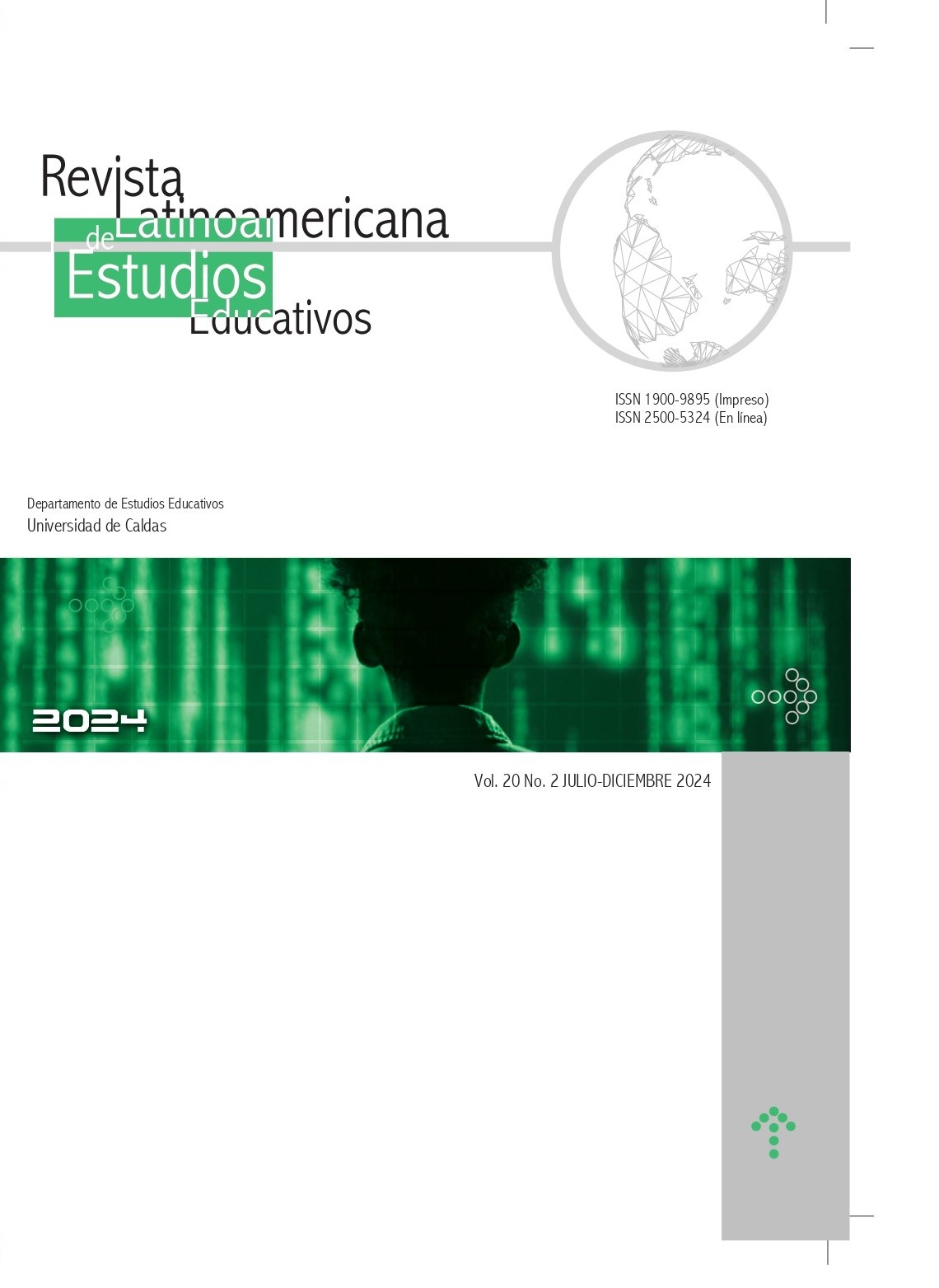Como Citar
Universidad de Caldas. (2025). Editorial. Latinoamericana De Estudios Educativos, 20(2), 7–10. https://doi.org/10.17151/rlee.2024.20.2.1
Fomatos de Citação
Autores
Resumo
- -
Referências
Apple, M. W. (2012). Education and power. Routledge.
Eccles, J. S., & Wigfield, A. (2020). From expectancy-value theory to situated expectancy-value theory: A developmental, social cognitive, and sociocultural
perspective on motivation. Contemporary Educational Psychology, 61, 101859.https://doi.org/10.1016/j.cedpsych.2020.101859
Epstein, J. L. (2011). School, family, and community partnerships: Preparing educators and improving schools. Routledge.
Freire, P. (1997). Pedagogía de la autonomía. Saberes necesarios para la práctica educativa. Siglo XXI.
Giroux, H. A. (2014). Neoliberalism’s war on higher education. Haymarket Books.
Halliday, M. A. K. (2004). An introduction to functional grammar. Arnold.
Holmes, W., Porayska-Pomsta, K., Holstein, K., Sutherland, E., Baker, T., Shum, S. B., Santos, O. C., & Koedinger, K. R. (2022). Ethics of AI in education: Towards a community-wide framework. International Journal of Artificial Intelligence in Education, 32(3), 504-526. https://doi.org/10.1007/s40593-021-00239-1
Krashen, S. (1982). Principles and practice in second language acquisition.Pergamon.
Marcelo, C. (2009). Desarrollo profesional docente: Pasado y futuro. Revista de Currículum y Formación del Profesorado, 13(2), 1-17.
Nussbaum, M. C. (2010). Not for profit: Why democracy needs the humanities. Princeton University Press.
Pintrich, P. R. (2003). A motivational science perspective on the role of student motivation in learning and teaching contexts. Journal of Educational Psychology, 95(4), 667–686. https://doi.org/10.1037/0022-0663.95.4.667
Selwyn, N. (2019). Should robots replace teachers? AI and the future of education.Polity.
Zeichner, K. (2010). Rethinking the connections between campus courses and field experiences in college- and university-based teacher education. Journal of Teacher Education, 61(1-2), 89–99. https://doi.org/10.1177/0022487109347671
Eccles, J. S., & Wigfield, A. (2020). From expectancy-value theory to situated expectancy-value theory: A developmental, social cognitive, and sociocultural
perspective on motivation. Contemporary Educational Psychology, 61, 101859.https://doi.org/10.1016/j.cedpsych.2020.101859
Epstein, J. L. (2011). School, family, and community partnerships: Preparing educators and improving schools. Routledge.
Freire, P. (1997). Pedagogía de la autonomía. Saberes necesarios para la práctica educativa. Siglo XXI.
Giroux, H. A. (2014). Neoliberalism’s war on higher education. Haymarket Books.
Halliday, M. A. K. (2004). An introduction to functional grammar. Arnold.
Holmes, W., Porayska-Pomsta, K., Holstein, K., Sutherland, E., Baker, T., Shum, S. B., Santos, O. C., & Koedinger, K. R. (2022). Ethics of AI in education: Towards a community-wide framework. International Journal of Artificial Intelligence in Education, 32(3), 504-526. https://doi.org/10.1007/s40593-021-00239-1
Krashen, S. (1982). Principles and practice in second language acquisition.Pergamon.
Marcelo, C. (2009). Desarrollo profesional docente: Pasado y futuro. Revista de Currículum y Formación del Profesorado, 13(2), 1-17.
Nussbaum, M. C. (2010). Not for profit: Why democracy needs the humanities. Princeton University Press.
Pintrich, P. R. (2003). A motivational science perspective on the role of student motivation in learning and teaching contexts. Journal of Educational Psychology, 95(4), 667–686. https://doi.org/10.1037/0022-0663.95.4.667
Selwyn, N. (2019). Should robots replace teachers? AI and the future of education.Polity.
Zeichner, K. (2010). Rethinking the connections between campus courses and field experiences in college- and university-based teacher education. Journal of Teacher Education, 61(1-2), 89–99. https://doi.org/10.1177/0022487109347671
Downloads
Não há dados estatísticos.

 PDF (Español)
PDF (Español)
 FLIP
FLIP























